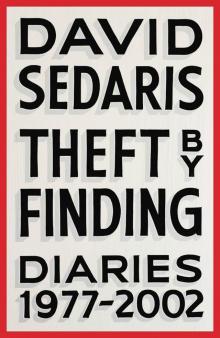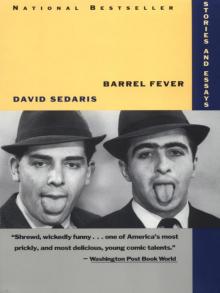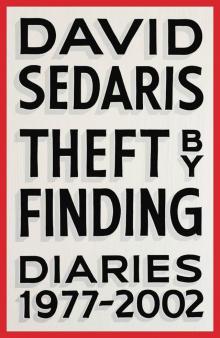- Home
- David Sedaris
Me Talk Pretty One Day Page 9
Me Talk Pretty One Day Read online
Page 9
I was down to a day and a half a week when Valencia called a mover to cart a load of furniture to an apartment she’d rented for one of the deadbeats. The man came alone, not bringing any helpers, as he’d been told it was a one-person job. It’s hard for one person to carry a sofa down three flights of stairs, so, seeing as I had nothing better to do, I offered to help. The man’s name was Patrick, and he spoke in a soft, hypnotic voice that made everything he said sound wise and comforting. “I can see that you’ve really got your hands full with that one,” he said, rolling his eyes toward Valencia’s office. “I’ve known broads like that all my life. She wants to be artsy and has settled on being cheap. I can tell I won’t be getting a tip out of her.”
After we’d carried the furniture to the deadbeat’s new apartment, Patrick offered me a job, and I took it.
“Terrific,” he said. “Get yourself a back brace, and I’ll see you in the morning.”
Because he was a card-carrying communist, Patrick hated being referred to as the boss. “This is a collective,” he’d say. “Sure, I might happen to own the truck, but that doesn’t make me any more valuable than the next guy. If I’m better than you, it’s only because I’m Irish.”
I’d never cared for any of the self-proclaimed Marxists I’d known back in college, but Patrick was different. One look at his teeth, and you could understand his crusade for universal health care. Both his glasses and his smile were held together with duct tape. Notable too was his willingness to engage in actual physical work. The communists I’d known in the past had always operated on the assumption that come the revolution, they’d be the ones lying around party headquarters with clipboards in their hands. They couldn’t manage to wash a coffee mug, yet they’d been more than willing to criticize the detergent manufacturer.
Patrick’s mugs were clean and neatly lined up on the drainboard. He lived alone in a tiny rent-controlled apartment filled with soft snack foods, letters from imprisoned radicals, and the sorts of newspapers that have no fashion section. His moving collective consisted of him, a dented bread truck, and a group of full- and part-time helpers hired according to availability and the size of any given job. Together we resembled the cast of a dopey situation comedy, something called Grin and Bear It, or Hello, Dolly. The part-time helpers included Lyle, a guitar-playing folksinger from Queens, and Ivan, a Russian immigrant on medication for what had been diagnosed as residual schizophrenia. I worked full-time, most often with a convicted murderer named Richie, who, at six feet four and close to 350 pounds, was a poster boy for both the moving industry and the failure of the criminal rehabilitation system. Convicted at the age of fifteen, he had served ten years in a combination of juvenile and adult penitentiaries on charges of arson and second-degree murder. The victim had been his sister’s boyfriend, whom Richie had burned to death because, in his words, “I don’t know. The guy was an asshole. What more do you want?” He thought of what he’d said and then retracted it, saying, “Rather, I found him to be untrustworthy. How’s that?” In an effort to impress his latest parole officer, Richie was trying to improve his vocabulary. “I can’t promise I’ll never kill anyone again,” he once said, strapping a refrigerator to his back. “It’s unrealistic to live your life within such strict parameters.”
It would be a stretch to say that I enjoyed coaxing mattresses up five flights of stairs, but it was nice to work as part of a team. The money was nothing compared with what other people earned answering phones or slipping suppositories into the rectums of senior citizens, but it was more than I had earned working for Valencia. The cash was bounce-proof, and most everyone included a tip. After having spent a year and a half cooped up in a little office, it felt good to get out and move around. Rego Park, Bayside, Harlem, Coney Island, the job introduced me to the various neighborhoods of Manhattan and the surrounding boroughs. It gave me a chance to look into people’s lives, to meet my fellow New Yorkers and carry their things.
Because Patrick didn’t believe in having himself bonded, we rarely moved anything of great value, no museum-quality paintings or extraordinary pieces of furniture. Most of our customers were moving into places they couldn’t quite afford. Their new, higher rents meant that they’d have to cut back on their spending, to work longer hours, or try to wean themselves off their costly psychiatrists. They were anxious about their future and quick to complain should a part of their past get scratched or broken. “The transitory state fucks with their heads,” Richie explained during my first week of work. “Me, I just try to ignore their stressed-outedness and concentrate on the gratuity.”
Moving heavy objects allowed me to feel manly in the eyes of other men. With the women it didn’t matter, but I enjoyed subtly intimidating the guys with bad backs who thought they were helping out by telling us how to pack the truck. The thinking was that because we were furniture movers, we obviously weren’t too bright. In addition to being strong and stupid, we were also thought of as dangerous. It might have been an old story to Patrick and the others, but I got a kick out of being mistaken as volatile. All I had to do was throw down my dolly with a little extra force, and a bossy customer would say, “Let’s just all calm down and try to work this out.”
I began to change in subtle ways and quickly lost patience with people who owned too many books. What had once seemed an honorable inclination now struck me as a heavy and inconvenient affectation. The conversation wasn’t as sparkling, but I found that I much preferred the stuffed-animal collectors. Boxes of records made me think that LPs should be outlawed or at least limited to five per person, and I soon came to despise the type who packs even her empty shampoo bottles, figuring she’ll sort things out and throw them away once she’s settled into her new place.
When faced with an apartment full of boxes, I’d pretend to be an ant assigned to transport sandwich crumbs back to my colony. There was no use trying to estimate how many trips it might involve, as that sort of thinking only wore me out in advance. Instead, I just took it box by box until it was my turn to guard the truck. Once we reached the new building, the process would be repeated, hopefully with an elevator. Standing in their new apartments, the air noxious with the smell of paint, the customers would determine the order of their new lives. “The sofa bed goes here — no, over there maybe. What do you think?” The schizophrenic was the best at giving decorating advice, though Richie wasn’t bad, either.
After a job was finished, we’d stand on the street drinking beer or foul-tasting Gatorade. The tip would be discussed, as would the disadvantages of living in this particular neighborhood. It was generally agreed that a coffin-size studio on Avenue D was preferable to living in one of the boroughs. Moving from one Brooklyn or Staten Island neighborhood to another was fine, but unless you had children to think about, even the homeless saw it as a step down to leave Manhattan. Customers quitting the island for Astoria or Cobble Hill would claim to welcome the change of pace, saying it would be nice to finally have a garden or live a little closer to the airport. They’d put a good face on it, but one could always detect an underlying sense of defeat. The apartments might be bigger and cheaper in other places, but one could never count on their old circle of friends making the long trip to attend a birthday party. Even Washington Heights was considered a stretch. People referred to it as Upstate New York, though it was right there in Manhattan.
Our bottles drained, Patrick would carry us back to what everyone but Lyle agreed was the center of the universe. Moving people from one place to another made me feel as though I performed a valuable service, recognized and appreciated by the city at large. In the grand scheme of things, I finally had a role to play. My place was not with Valencia but here, riding in a bread truck with my friends. My friend the communist, my friend the schizophrenic, and my friend the murderer.
The first of the month was always the busiest time, but there were more than enough minor jobs and unhappy marriages to pull us through. In other parts of the country people tried to stay together for the s
ake of the children. In New York they tried to work things out for the sake of the apartment. Leaving a spacious, reasonably priced one-bedroom in the middle of the month usually signified that someone had done something really bad. We’d empty a place of half its possessions and listen to the details as we drove the former tenant to a quickly rented storage space. The truck made a good deal of noise, and although the injured party was always eager to talk, he had to significantly raise his voice to be heard. I liked being told these stories, but it was odd hearing such personal information shouted rather than whispered.
“THEN SHE WHAT?” Richie or I would scream.
“FUCKED HER EX-BOYFRIEND ON THIS SOFA I’D BOUGHT FOR OUR ANNIVERSARY.”
“ON THE WHAT?”
“THE SOFA I’M SITTING ON. SHE FUCKED HER EX-BOYFRIEND ON THIS SOFA.”
“HOW MANY TIMES?” we’d ask.
“HUH?”
“I SAID, ‘HOW MANY TIMES?’”
“JUST ONCE THAT I KNOW OF, BUT ISN’T THAT ENOUGH?”
“IT DEPENDS. HOW MUCH WAS YOUR RENT?”
When the citizens of New York went looking for a new apartment, they came to us. Some movers charged for their inside information, but, with the exception of Richie, we gave it away for free. Strangers would often flag down the loaded van and ask where we were coming from. “Do you know if it’s already been rented? Does it have a tub or a shower?” They asked the same thing of the emergency medical crews pulling up to the hospital morgue. “What floor did the victim live on? Did the apartment get much light?”
I’d been raised with the impression that it took a certain amount of know-how to get by in New York, but a surprising number of our customers proved me wrong. Here were people who packed two hundred pounds of dishes into a single box the size of a doghouse, or even worse, people who didn’t pack at all. One evening we went to move an attractive young woman who found it charming to spell the name Kim with an h, a y, and two ms. The door opened to the sound of nerve-shattering club music broadcast from an enormous stereo system. Popcorn snapped away on the stovetop and everything appeared to be in its rightful place. I assumed that we had the wrong apartment and was ready to apologize when she said, “Are you the movers? Great, come on in.”
The phone rang and she talked for a few moments before covering the mouthpiece to say, “I couldn’t find any boxes or anything, so just … you know.”
“Just ‘you know’ what?” Richie asked. “Just use our fucking magic powers or just, you know, go home?”
He and I were ready to leave. It irritated us that this girl couldn’t even manage to pack. You don’t just place a red-hot skillet on the floor of a moving truck, and besides, if she couldn’t bother to round up a few dozen boxes, there was little chance she’d come through with much of a tip. Khymm struck me as the sort of person who had always gotten by on her looks. People had probably forgiven her for all kinds of things, but I doubted she’d get much sympathy out of Patrick. It was my understanding that communists preferred beefy, corn-fed girls with thick ankles and strong backs, all the better for threshing wheat and lugging heavy sacks of rice.
“Well?” Richie asked.
Patrick threw up his hands. “Oh, what the hell. We’re here, aren’t we?”
The young woman had a small dog, a Pomeranian, that yapped nonstop during the three hours it took to empty the apartment. She herself did nothing to help but rather talked on the phone, occasionally pausing to yell, “That’s very collectible,” or “Be careful with the fish, I’m pretty sure the female is pregnant.” While climbing the three flights of stairs for another armload of shampoo bottles, I entertained cruel fantasies, which grew more pronounced once we’d packed up the truck and arrived at her new apartment, on the fifth floor of yet another walk-up building. Just as I had predicted, our tip consisted of a toothy smile and the ridiculous suggestion that we have a nice evening. Patrick gave us a little something extra for our troubles but refused to join in when Richie and I grumbled about the girl’s prizewinning idiocy.
“Oh, give her a break. She was a good kid.” He could be very unpredictable that way. Sometimes we’d walk into an organized, well-packed apartment, and if the client was male and obviously very successful, Patrick would cancel the job, claiming that his axle had just broken or that the truck’s transmission had given out. “Sorry, friend, but I just can’t do it.” He’d give the guy the number of one of his competitors and then he would leave, delighted by the great inconvenience he had caused.
“Guys like that are bad news,” he’d say, heading back to the truck. “So how about it, boys, are any of you up for a piping hot cup of coffee? My treat.”
I was rarely appeased by the words piping hot. I didn’t want a cup of coffee, I wanted to work. “What was wrong with that guy?” I’d ask. “It was an elevator building, for God’s sake. That was good money.”
Patrick would throw back his head and let out his hearty communist laugh, an extended bray that suggested I was young and could not yet tell the difference between good money and bad.
“We’ll do a big job tomorrow,” he’d say. “Relax, brother. How much money do you need?”
“Enough for a town house,” I’d say.
“You don’t want a town house.”
“Yes, I do.”
“Well, then, you’re definitely in the wrong business.”
He was right about that. Carrying boxes up and down stairs wasn’t going to earn me a million dollars. Still, the extra money in my pocket allowed me to walk down the street not caring that other people had more than I did. I’d go to a movie or buy a dime bag of pot from Richie and not feel burdened by envy. I just had to understand that for Patrick, moving a certain kind of person was the equivalent of me calling a pigeon Cheeky — it simply wasn’t worth the money to him. Maybe he felt those men looking at his teeth and thinking him a loser. In their great, tenacious drive to succeed, perhaps Patrick saw the futility of his own struggle. Detailed questions about his decisions only led to the quoting of Marx and Lenin, so I soon learned to stop asking.
The best of times were snappy autumn afternoons when we’d finished moving a two-bedroom customer from Manhattan to some faraway neighborhood in Brooklyn or Queens. The side doors would be open as we crowded in the front seat, Patrick listening to a taped translation of Chairman Mao boasting about “the great leap forward.” Traffic would be heavy on the bridge due to an accident, and because we were paid for travel time, we’d hope that the pileup involved at least one piece of heavy machinery. When the tape became too monotonous, I’d ask Richie about his days at the reformatory and pleasantly drowse as he spoke of twelve-year-old car thieves and boys who had killed their brothers over an ice-cream sandwich. Patrick would get involved, saying that violent crime was a natural consequence of the capitalist system, and then, eventually, the New York skyline would appear on the horizon and we’d all stop talking. If you happen to live there, it’s always refreshing to view Manhattan from afar. Up close the city constitutes an oppressive series of staircases, but from a distance it inspires fantasies of wealth and power so profound that even our communists are temporarily rendered speechless.
Today’s Special
IT IS HIS BIRTHDAY, and Hugh and I are seated in a New York restaurant, awaiting the arrival of our fifteen-word entrées. He looks very nice, dressed in the suit and sweater that have always belonged to him. As for me, I own only my shoes, pants, shirt, and tie. My jacket belongs to the restaurant and was offered as a loan by the maître d’, who apparently thought I would feel more comfortable dressed to lead a high-school marching band.
I’m worrying the thick gold braids decorating my sleeves when the waiter presents us with what he calls “a little something to amuse the palette.” Roughly the size and color of a Band-Aid, the amusement floats on a shallow, muddy puddle of sauce and is topped with a sprig of greenery.
“And this would be … what, exactly?” Hugh asks.
“This,” the waiter announces, “Is our r
aw Atlantic sword-fish served in a dark chocolate gravy and garnished with fresh mint.”
“Not again,” I say. “Can’t you guys come up with something a little less conventional?”
“Love your jacket,” the waiter whispers.
As a rule, I’m no great fan of eating out in New York restaurants. It’s hard to love a place that’s outlawed smoking but finds it perfectly acceptable to serve raw fish in a bath of chocolate. There are no normal restaurants left, at least in our neighborhood. The diners have all been taken over by precious little bistros boasting a menu of indigenous American cuisine. They call these meals “traditional,” yet they’re rarely the American dishes I remember. The patty melt has been pushed aside in favor of the herb-encrusted medallions of baby artichoke hearts, which never leave me thinking, Oh, right, those! I wonder if they’re as good as the ones my mom used to make.
Part of the problem is that we live in the wrong part of town. SoHo is not a macaroni salad kind of place. This is where the world’s brightest young talents come to braise carmelized racks of corn-fed songbirds or offer up their famous knuckle of flash-seared crappie served with a collar of chided ginger and cornered by a tribe of kiln-roasted Chilean toadstools, teased with a warm spray of clarified musk oil. Even when they promise something simple, they’ve got to tart it up — the meatloaf has been poached in seawater, or there are figs in the tuna salad. If cooking is an art, I think we’re in our Dada phase.
I’ve never thought of myself as a particularly finicky eater, but it’s hard to be a good sport when each dish seems to include no fewer than a dozen ingredients, one of which I’m bound to dislike. I’d order the skirt steak with a medley of suffocated peaches, but I’m put off by the aspirin sauce. The sea scallops look good until I’m told they’re served in a broth of malt liquor and mummified litchi nuts. What I really want is a cigarette, and I’m always searching the menu in the hope that some courageous young chef has finally recognized tobacco as a vegetable. Bake it, steam it, grill it, or stuff it into littleneck clams, I just need something familiar that I can hold onto.

 Me Talk Pretty One Day
Me Talk Pretty One Day Calypso
Calypso Holidays on Ice
Holidays on Ice Mi vida en rose
Mi vida en rose 1994 - Barrel Fever
1994 - Barrel Fever Naked
Naked Dress Your Family in Corduroy and Denim
Dress Your Family in Corduroy and Denim When You Are Engulfed in Flames
When You Are Engulfed in Flames Theft by Finding: Diaries 1977-2002
Theft by Finding: Diaries 1977-2002 Let's Explore Diabetes With Owls
Let's Explore Diabetes With Owls Squirrel Seeks Chipmunk: A Modest Bestiary
Squirrel Seeks Chipmunk: A Modest Bestiary Children Playing Before a Statue of Hercules
Children Playing Before a Statue of Hercules The Best of Me
The Best of Me Barrel Fever
Barrel Fever Squirrel Seeks Chipmunk
Squirrel Seeks Chipmunk Theft by Finding
Theft by Finding Barrel Fever and Other Stories
Barrel Fever and Other Stories